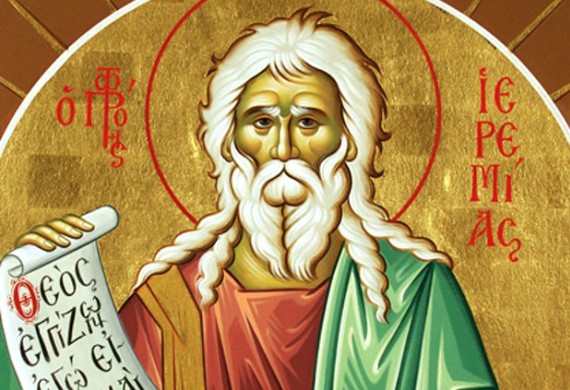The prophet Jeremiah lived and acted in biblical Israel, specifically in the kingdom of Judah from the 7th to the 6th century BC. He came from a priestly family, and he accepted the prophetic call at a young age, while he was already chosen by God from his mother’s womb: “Before I formed thee in the belly I knew thee; and before thou camest forth out of the womb I sanctified thee, and I ordained thee a prophet unto the nations.” (Jer 1:5). He ranks among the Great Prophets, and his activities are chronicled in the book of the Old Testament that bears his name. Also, the books: “Lamentations of Jeremiah” and “Epistle of Jeremiah”, have been written by Jeremiah according to the tradition. His writings reveal a structured personality that, despite his martyrdom, was completely devoted to God. It is apparent from the first verses of the book, the absolute devotion to his prophetic mission: “See, I have this day set thee over the nations and over the kingdoms, to root out, and to pull down, and to destroy, and to throw down, to build, and to plant” (Jer 1:10), the struggle is uncompromising: “I came to root out”, he came to fight the establishment and the moral decadence of his time, “and to plant”, preaching an inner spirituality outside of religious formalism, introducing a personal relationship with God, a more meaningful personal religious expression. He takes Israel’s piety out of the sterile legalism in which it had been bogged down. The prophet preached against the foreign gods, the gods of the nations ” which are yet no gods” (Jer 2,11). He reproved the heretical syncretism that was prevailing in the kingdom of Judah while he was hated by his people and by the authorities, both religious and political. He is directed against injustice, immorality and idolatry. He supported only authentic forms of religious expression, such as in the Rechabites, and was successful against the formalism expressed by most of the official priesthood of the time. He foretells the destruction of Jerusalem (Jer 10,17-22), and provides as the only solution the repentance of man. He does not hesitate to reprove the kings for their unpopular policies, the rich for the oppression of the poor, the priesthood for syncretism and profiteering, but also the people themselves for the fall into which they had fallen. As a result, he became undesirable to his contemporaries, and “stone of scandal.” Jeremiah becomes a sorrowful prophet. He goes through endless humiliations and persecutions, events that forged his psyche. Even his relatives conspire against him, they decide to poison him, he is forbidden to enter the Temple, he is thrown into a gurgling pit, his works are burned, he is exiled to Egypt. And finally, according to tradition, the Prophet is stoned by his compatriots in the city of Taphna in Egypt, so that the “narrow and weary way” of his life ends in martyrdom. The book of Jeremiah contains extensive monologues by the tormented prophet. Autobiographical verses, in which the pain of a mocked and abandoned person dominates: “O Lord, thou hast deceived me, and I was deceived; thou art stronger than I, and hast prevailed: I am in derision daily, every one mocketh me” (Jer 20,7). These monologues are related to the Lamentations, and written using the same dramatic style. The Jeremiah’s lament is the desperate plea of a prophet who has seen everything perish, who sees his lonely struggles as fruitless, who reaches the point of complete condemnation: “Cursed be the day wherein I was born: let not the day wherein my mother bare me be blessed.” (Jer 20:14). In the verses of Jeremiah’s monologues we observe an authenticity and a unique directness and sincerity, where the human “fights” with the divine, where man experiences the emptiness of divine abandonment but also after countless struggles, experience the repleteness of divine supplication. The profound spirituality of Jeremiah remained proverbial in the tradition of Israel, which is why Christ was called “another Jeremiah” (see Matt. 16:14). He becomes the prophet who pre-eminently envisions the meaning of the New Testament: “But this shall be the covenant that I will make with the house of Israel; After those days, saith the Lord, I will put my law in their inward parts, and write it in their hearts; and will be their God, and they shall be my people.” (Jer 38,31), the Lord spoke through the prophet: I will conclude a New Covenant with you that I will write in your hearts; you will no longer have a formal relationship with me; my relationship with you will no longer be a matter of compliance with formal regulations, but a matter of internal longing and preference. This is the intersection of Jeremiah’s preaching with the past, and this is the eschatological vision of the prophet, which is a new personal relationship-communion between God and man. According to Jeremiah, God does not want to impose lifeless rituals, but to touch the inner man. The Prophet’s life is a lonely journey of one versus all, of sacrificing one for the sake of all people, a constant lament of a tortured man of God that people could not comprehend him, who experienced contempt at the extremes, and sought only in Lord for peace and justice. He walked this path ascetically, as a martyr, and was thus elevated to the choir of the great biblical prophets, who paved the way for the coming of the Messiah Jesus Christ. Holy Prophet Jeremiah is commemorated on May 1st each year.
Translated by Dr. Nick Stergiou

